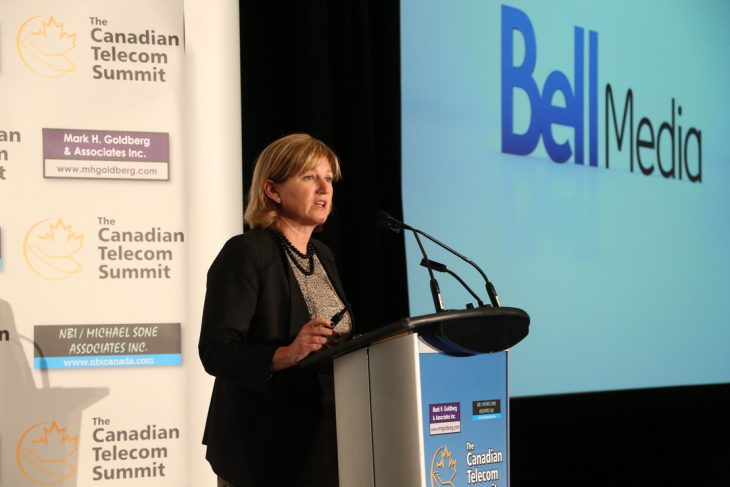
TORONTO – In a bit of a departure from the messages we’ve heard from Bell Media in recent years and months, its new president said Wednesday that she is confident in the future of local TV stations and local content.
While Bell Media went into the CRTC’s Let’s Talk TV process last year saying drastic action is needed to save local TV, its new president, Mary Ann Turcke had a more positive message. In a luncheon speech to the Canadian Telecom Summit (on day 56 into her job) she said local content “is fun, it’s relevant, it’s meaningful and we believe it’s good business.”
This runs counter to the conventional wisdom which informs the overall narrative about conventional local TV broadcasters (and counter to the stance of former division president Kevin Crull). “For years, we’ve heard that local television stations are losing millions, they are dying,” she added. “I beg to differ.
“Job growth in this country has long been attributed to small business – local businesses advertising on local stations constitutes an economic ecosystem that is not insignificant. (Local TV) may not be what it was a decade ago – but it is not dying.
“The truth is local television and radio continue to reach a broad audience and can provide a unique megaphone that is increasingly elusive in our fragmented media environment. Millions and millions of Canadians tune into their local news at 6 p.m. to hear stories, and dare I say advertising, relevant to them. This has not just private value but an incredible public value as well.”
She also pointed out company research shows that the average age of the audience of the company’s local CTV news across the country is actually getting younger.
That’s not to say all is rosy. Revenues are down and viewership is shifting. “The private value is under pressure – we are trying our best to make sure it remains a good business – but the economics are not what they used to be… My goal is to find ways to become more productive on a national level – through business improvements – to support, what I believe to be a local presence that is critical to Canadians across this country.”
Part of the solution to boosting Bell Media’s relevance is to make its content more accessible across as many platforms as possible, but it’s not easy. “Distinctions between linear and online streaming rights, distinctions between ‘windows’ and distinctions between national borders is not something our consumers are willing to tolerate – it is enough to drive anyone to the dreaded Netflix. Legally or illegally.
“Understanding and streamlining the rights ecosystem is critical if we want to create an environment where Canadians can discover great content on a wide variety of platforms,” she said.
It’s the illegality of viewing the U.S. Netflix stream from Canada using a virtual private network (VPN) which will surely earn Turcke some headlines (and this stance is no departure from the position of her predecessor). “Piracy is an issue. It happened in my house a few weeks ago,” she said, noting her 15-year-old daughter was using a VPN to watch the U.S. Netflix stream.
“It has to become socially unacceptable to admit to another human being that you are VPNing into U.S. Netflix. Like throwing garbage out your car window – you just don’t do it.” – Mary Ann Turcke, Bell Media
“She was told she was stealing and that it was like stealing anything else,” said Turcke. “She probably listened to us like Charlie Brown listens to his parents – there was eye rolling… suffice to say there is no more VPNing.”
Turcke urged everyone in the content business to shore up their content security and wants the industry to work together to make sure people understand the value of content – and that it costs serious money to create it. She believes the government and CRTC shouldn’t be relied upon to stop it and that the companies with a vested interest in secure content must work on changing the culture where VPNing is seen not as a victimless crime – but not any sort of problem at all.
“It takes behavioural change and it is the people – friend to friend, parent to child, co-worker to co-worker – that set the cultural framework for acceptable and unacceptable behaviour,” she said. “It has to become socially unacceptable to admit to another human being that you are VPNing into U.S. Netflix. Like throwing garbage out your car window – you just don’t do it.
“We have to get engaged and tell people they are stealing. When we were young and made the error of swiping the candy bar at the check out of the grocery store, what did our parents do? They marched us back in, humiliated us, told us to apologize to the nice lady and likely scolded us on the way home,” Turcke explained.
“Meanwhile, not only does society not scold anyone for stealing content – we feature ‘how-to’ articles in our national newspapers – educating the masses on how to get around copyright law.
“We need to reinforce that everyday Canadians and North Americans are affected by the theft of the content they produce. The Canadian production industry employs 125,000 people, and is worth nearly $6 billion a year to the economy. These are neighbours, friends, relatives. We need to personalize the fact that content is produced by real people, and that stealing it affects their livelihoods,” she continued.
“Yes we need the support of government and the CRTC – and maybe we use the discoverability summit to contemplate illegal discoverability and what it means to our industry.”
Photo by Michal Tomaszewski / Pinpoint National


